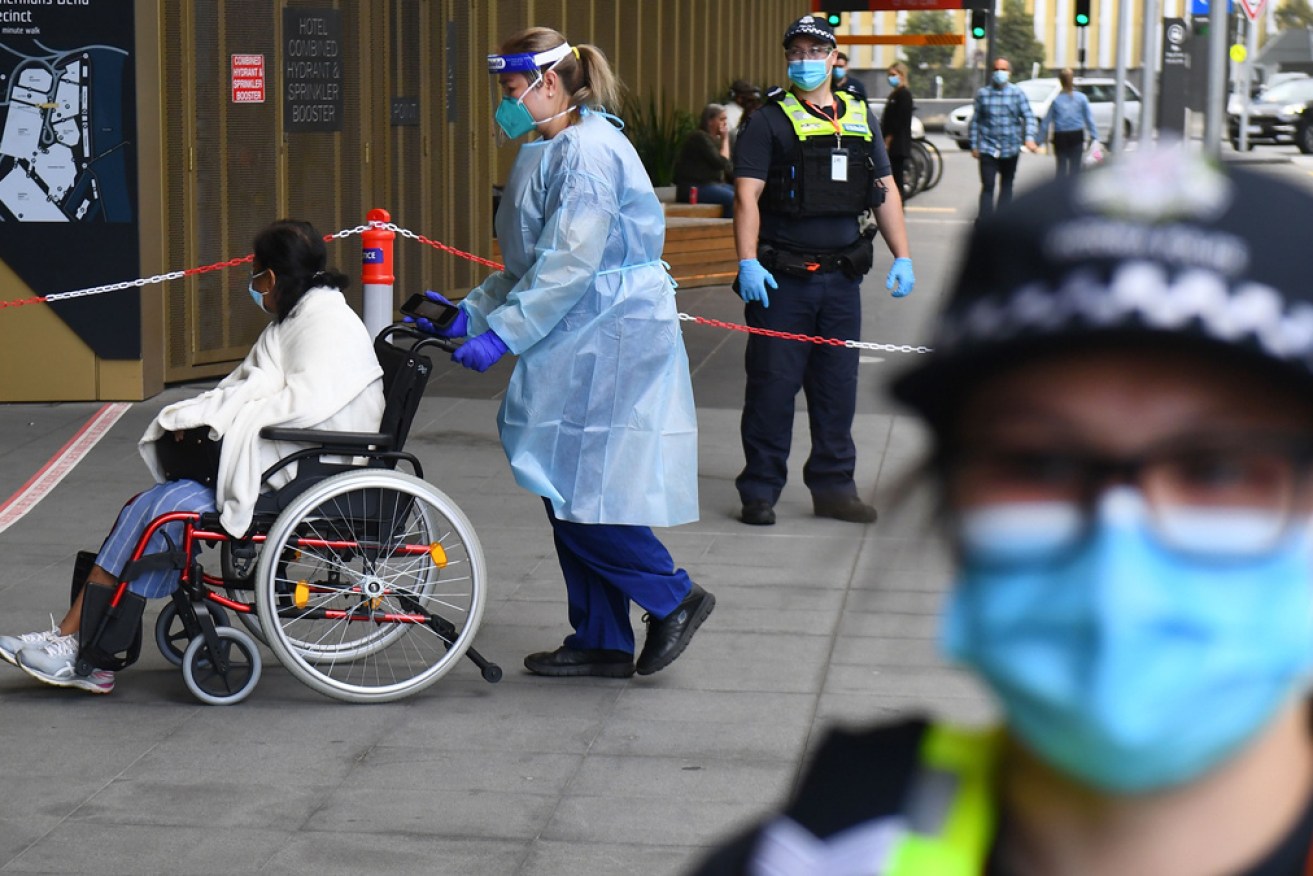Epidemiologist warns COVID vaccine delays mean more lockdowns likely


Staff in Victoria's rebooted hotel quarantine program will be COVID tested daily. Photo: Getty
Further lockdowns are all but guaranteed in Australia if we don’t speed up vaccinations of essential workers, a leading epidemiologist has warned.
The sudden outbreak, sparked by a returned traveller, forced the Queensland government to make COVID-19 vaccinations compulsory for all healthcare workers directly assisting coronavirus patients.
But a top diseases expert says this should have been done sooner.
Professor Marylouise McLaws, a UNSW epidemiology professor and adviser to the World Health Organisation, said vaccinating frontline workers was a crucial first line of defence that will help prevent the virus from leaking into the community.
“The example in Queensland of that imperfection is a very timely story and lesson,” she told The New Daily.
“That poor infectious diseases physician who looked after a traveller should have been vaccinated, then tested at the end of every shift.”
Queensland Premier Annastacia Palaszczuk vowed on Tuesday to have all remaining healthcare and quarantine workers vaccinated within the next 48 hours.
Victoria’s next challenge
Passenger flights have not arrived in Melbourne since February 14, when the Holiday Inn cluster – which blew out to almost 25 cases – triggered a five-day snap lockdown.
The Brisbane outbreak is a fresh reminder of what could happen in Victoria when international travel reopens on April 8.
The plan is to have all returned travellers flying into Melbourne to undertake 14 days’ mandatory hotel quarantine, under a revamped program.
Upgrades will include improved ventilation systems, more testing of returned travellers, and enhanced infection-control protocols aimed at containing the new, highly infectious strains dominating across the globe.
“We need to roll the vaccine out fast and keep any of the variants of concern out of the community,” Professor McLaws said.
“Quarantine hotels need to be perfect. Absolutely perfect.”
Initially, arrivals in Melbourne will be capped at 800 a week, scaling up to 1120 by April 15, subject to the completion of ventilation works at hotels.
Plans are under way to build a purpose-built quarantine facility outside Melbourne, however, authorities say that facility will take at least six months to build.
Jabs per state
All Victorian quarantine workers have received at least one jab, according to the state’s Department of Health and Human Services (DHHS).
More than two-thirds of Victorian health workers under Phase1a of the rollout have also received their first dose.
Speaking on ABC radio on Wednesday morning, Victoria’s COVID-19 testing commander Jeroen Weimar said only a few off-duty hotel employees were still awaiting their first dose.
Meanwhile, the NSW Health Department has confirmed to TND that all frontline workers involved in the state’s hotel quarantine program have received at least one jab, “with many fully vaccinated”.
The situation in Queensland is just the latest example of returned travellers unknowingly bringing the virus into Australia.
In Queensland, cases have leapt from five to 78 in just five weeks – most of which were acquired overseas.
Nearly 90 per cent of the state’s 21,000 high-risk frontline health workers have received their first vaccine dose, Queensland Health confirmed to TND.
Notably, that figure does not include hotel quarantine staff, nor the Queensland police officers escorting returned travellers to the hotels.
Associate Professor Ian Mackay, a virologist at the University of Queensland, said vaccines would only get us so far.
“What I’m still not entirely clear about is whether the vaccine will prevent transmission, as much as it prevents serious disease and death,” he told TND.
“There’s every likelihood (quarantine workers) won’t get seriously ill if they’re vaccinated, but they may pass it on to their families or other contacts who aren’t yet vaccinated.”
However, he agreed the Australians at the highest risk of of spreading the virus were those working with returned travellers, whether that be at the border, in hotel quarantine or in a hospital.
“It’s important to get as many people vaccinated as quickly as possible,” he said.
Vaccinations by the states
South Australia’s Health Department confirmed it has vaccinated more than 24,145 people in total, but could not provide a data breakdown.
TND understands SA’s international pilots, flight attendants and other transport workers dealing with returned travellers have not yet been vaccinated.
As of Sunday, more than 10,280 vaccine doses had been administered in the ACT.
In Western Australia, more than 2190 border workers have received their first dose, and 878 hotel quarantine workers (including health, hotel and security staff) have received at least one dose.
The health departments in Tasmania and the Northern Territory did not respond to TND before deadline.
About 36,000 people are currently registered with the Department of Foreign Affairs and Trade as being overseas and wanting to return.








